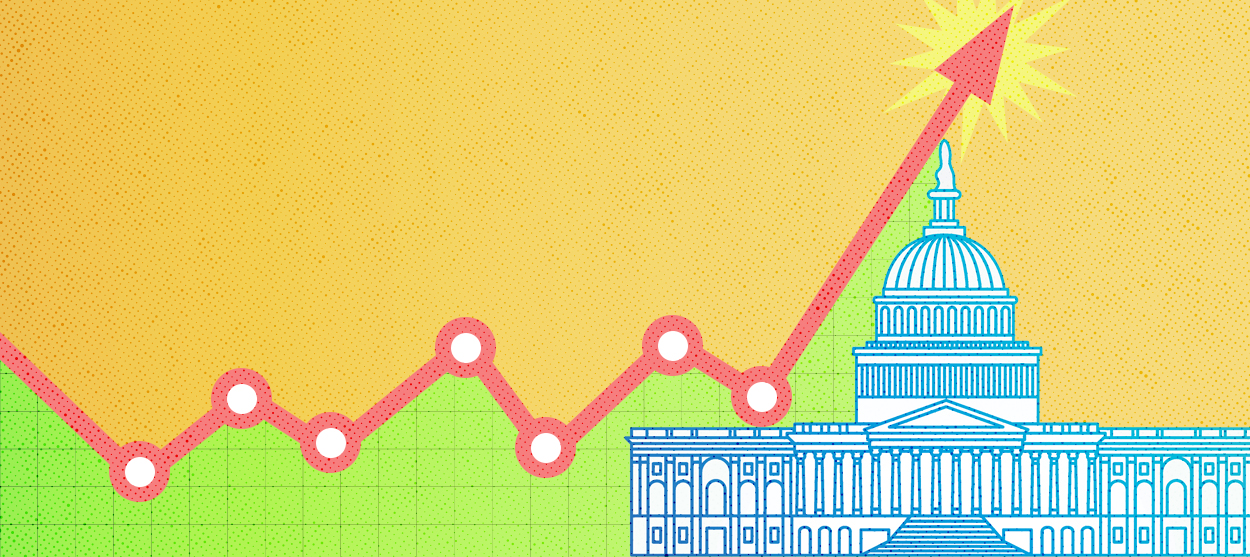Let's not screw up the U.S. economy now
2021 is set to be a boom year — if Congress does the right thing


A free daily email with the biggest news stories of the day – and the best features from TheWeek.com
You are now subscribed
Your newsletter sign-up was successful
Good luck predicting the next zig or zag of the American economy. But this seems as close to a gimme prediction as one is likely to find: Next year is going to be pretty darn boomy. It might be the growthiest year since the 1990s or even maybe the 1980s. The Federal Reserve on Wednesday raised its expectations for 2021 real GDP growth to 4.2 percent from 4.0 percent previously. The Wall Street consensus is for nearly 4 percent growth, but some major firms are even more optimistic. Goldman Sachs is forecasting 5.3 percent growth, Morgan Stanley 5.9 percent. The last time the U.S. saw a full year of growth at 5 percent or more was 1984 as the economy was roaring back from the 1981-82 recession, the worst since the 1930s Great Depression.
There's no super-secret forecasting formula at play here. The economic logic is simple: The outbreak of COVID-19 badly sickened the economy, and a reversal will revive it. A v-shaped recovery with the "v" standing for vaccine. Widespread immunization will mean the unleashing of pent-up consumer demand and business inventory rebuilding. Economic activity should be especially strong in badly depressed sectors such as travel, restaurants, and hotels. When people wonder why the stock market is doing so well even with a struggling economy, the answer has a lot to do with investors seeing brighter skies ahead.
So let's hope Washington doesn't, you know, screw things up. Let's hope Democratic and Republican policymakers soon manage to agree on a very large fiscal relief package. All of those bullish forecasts assume Congress gets its act together to pass at least a $700 billion package — with many firms preferring something closer to $1 trillion — that President Trump then signs. Mark Zandi, chief economist at Moody's Analytics, was clear and direct with the firm's clients earlier this week: "Lawmakers must act quickly to forestall a double-dip recession. If not in the current lame-duck session of Congress, they must move very early in the new Biden administration. The intensifying pandemic is weighing more and more heavily on the economy."
The Week
Escape your echo chamber. Get the facts behind the news, plus analysis from multiple perspectives.

Sign up for The Week's Free Newsletters
From our morning news briefing to a weekly Good News Newsletter, get the best of The Week delivered directly to your inbox.
From our morning news briefing to a weekly Good News Newsletter, get the best of The Week delivered directly to your inbox.
Indeed it is. The economic stall is becoming ever more evident in all sorts of economic statistics, from slowing employment growth to rising jobless claims to weakening business sentiment. Zandi sees three different potential economic outcomes (all assuming no vaccine distribution hiccups): If Washington comes through with something like $900 billion, "then the economy will avoid significantly backtracking in the next few months and be off and running by this time next year." The current 6.7 percent unemployment rate might not budge much, but that's only because job growth would be balanced by Americans looking for work again and flooding back into the labor force. But if Washington fails to act, brace yourself. In that scenario, Zandi sees a double-dip recession with unemployment rising to over 9 percent by summer. And if Washington comes through with something like a trillion now, and then another trillion early in the Biden administration, "The economy would quickly kick into a higher gear and unemployment would steadily fall, declining to near 5 percent by year's end 2021."
While some economists might disagree about the need for that second trillion bucks, agreement about the immediate need for at least something close to a trillion seems pretty universal. The main reason for pessimism here is that we still don't have a deal despite a need that's been obvious for months. And the best reason for optimism: Washington has actually done a pretty good job so far with its economic response. Washington has pushed out financial help of $2.5 trillion, or almost 12 percent of pre-pandemic GDP. Australia is the only other advanced economy to do more, Zandi notes.
Thanks to all that aid — including expanded jobless benefits and aid to businesses — America has been able to limit the amount of deep, long-term economic damage. A recent Goldman Sachs analysis finds two-thirds of the 25 million jobs lost at the start of the pandemic have returned, with nearly half of the unemployed saying they are on temporary layoff. Moreover, the pace of big-company bankruptcies has slowed to pre-pandemic levels.
In other words, America is far from a failed state, despite plenty of spicy hot-takes making that claim over the past six months. Rapid vaccine development, a strong economic response, and successfully running a general election during the worst pandemic in a century indicate that we're not utterly incompetent. But failing to supply more economic relief at this critical moment would be a black mark on that not-terrible record.
A free daily email with the biggest news stories of the day – and the best features from TheWeek.com
Want more essential commentary and analysis like this delivered straight to your inbox? Sign up for The Week's "Today's best articles" newsletter here.
James Pethokoukis is the DeWitt Wallace Fellow at the American Enterprise Institute where he runs the AEIdeas blog. He has also written for The New York Times, National Review, Commentary, The Weekly Standard, and other places.
